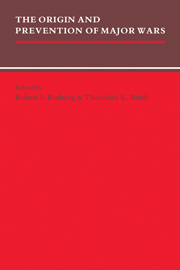Book contents
- Frontmatter
- Contents
- Introduction
- The Origins of War: Structural Theories
- The Theory of Hegemonic War
- The Origins of War in Neorealist Theory
- The Contribution of Expected Utility Theory to the Study of International Conflict
- The Origins of War: Explanation of Non-rational Causality
- Lessons and Analogies from Early Major Wars
- Lessons and Analogies from the World Wars
The Theory of Hegemonic War
Published online by Cambridge University Press: 02 December 2009
- Frontmatter
- Contents
- Introduction
- The Origins of War: Structural Theories
- The Theory of Hegemonic War
- The Origins of War in Neorealist Theory
- The Contribution of Expected Utility Theory to the Study of International Conflict
- The Origins of War: Explanation of Non-rational Causality
- Lessons and Analogies from Early Major Wars
- Lessons and Analogies from the World Wars
Summary
In the introduction to his history of the great war between the Spartans and the Athenians, Thucydides wrote that he was addressing “those inquirers who desire an exact knowledge of the past as an aid to the interpretation of the future, which in the course of human things must resemble if it does not reflect it… In fine, I have written my work, not as an essay which is to win the applause of the moment, but as a possession for all time.” Thucydides, assuming that the behavior and phenomena that he observed would repeat themselves throughout human history, intended to reveal the underlying and unalterable nature of what is today called international relations.
In the language of contemporary social science, Thucydides believed that he had uncovered the general law of the dynamics of international relations. Although differences exist between Thucydides' conceptions of scientific law and methodology and those of present-day students of international relations, it is significant that Thucydides was the first to set forth the idea that the dynamic of international relations is provided by the differential growth of power among states. This fundamental idea—that the uneven growth of power among states is the driving force of international relations can be identified as the theory of hegemonic war.
This essay argues that Thucydides' theory of hegemonic war constitutes one of the central organizing ideas for the study of international relations.
- Type
- Chapter
- Information
- The Origin and Prevention of Major Wars , pp. 15 - 38Publisher: Cambridge University PressPrint publication year: 1989
- 1
- Cited by



